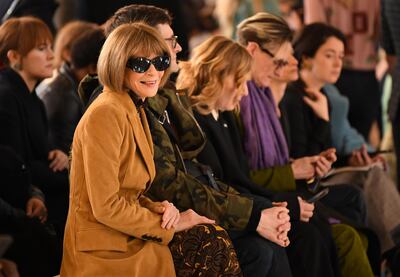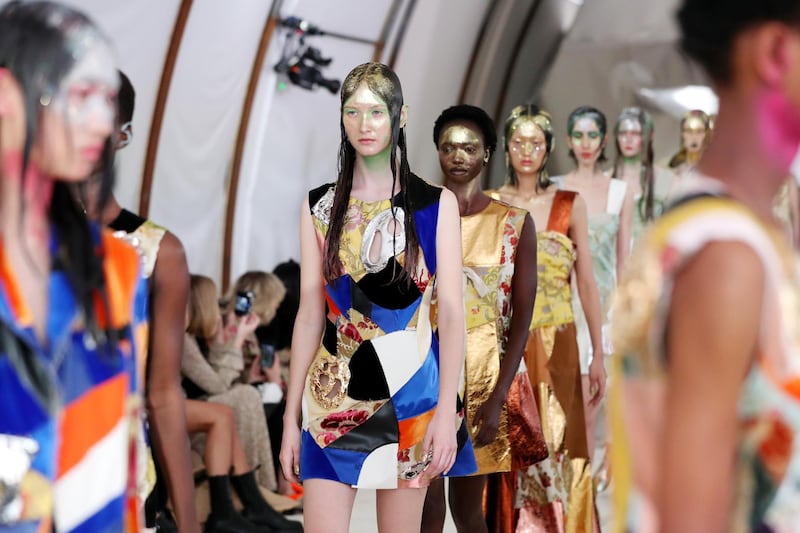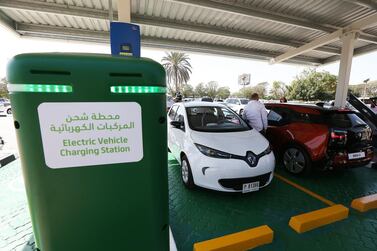This week, we debate whether fashion weeks have a place in the modern day. The National's deputy features editor Emma Day thinks it's time for a change, while deputy Luxury editor Sarah Maisey think we need the magic and wonder they bring.
Emma Day: So, fashion week closed on Tuesday for the autumn / winter 2020 season. While many are talking about the trends emerging from the runways, I'm here to ask: do we still need fashion weeks?
Sarah Maisey: I would say definitely, yes we do. Personally, I am a big fan of the runway shows – the lights, the music and all that pizzazz – it's wonderful. It's meant to be a visual extravaganza. Fashion is about fantasy storytelling, and what better way than a catwalk show?
ED: I agree that they're a feast for the eyes that provide an escape from some of the bleaker realities of the modern world but, in this day and age, do we still need people at them? The first official fashion week was held in 1943, before TV and social media. Nowadays, we could simply stream them without a crowd, as Giorgio Armani did in Milan last month (although that was a preventative measure due to coronavirus).
SM: We could certainly just live-stream the whole show like Armani did, I agree, but what a wasted opportunity. The runway is the only chance for the designer to get his or her message across, best seen at the recent Balenciaga show in Paris, which was staged as a taste of the apocalypse; the first three rows of seats were under flood water and the ceiling was filled with menacing storm clouds. With a runway presentation, however staged, the designer gets to show us the thinking behind each collection, and that is an invaluable insight.
ED: But is that the kind of expensive, unsustainable vanity project that we can justify nowadays? After all, if we had audience-free shows, there wouldn't be thousands of people flying between four cities at least two times a year ...

SM: Not only do I think it's justifiable, I think it's absolutely vital. We live in an era dominated by digital, and because of that we are forgetting the living element behind everything. We have foregone phone calls for WhatsApp messages, and spend hours glued to our screens watching other people's lives, while ignoring our neighbours next door. We are disconnected from our food through the cling-wrapped parcels in supermarkets, we have no connection with nature any more because of all the tarmac and concrete around us. Yes, fashion shows may be overblown and ridiculously expensive, but they are also one of the last few remaining connections with real, unfettered human creativity.
ED: I see your point, but then again, they're exclusive, invite-only affairs, still limiting the contact everyone has with that creativity. Do you think fashion weeks should still be the haunt of fashion editors, celebrities and bloggers, or should become a bit more accessible going forward?
SM: This is always going to be a sticking point for shows. I totally agree with you because yes, they are small and elitist. I know many labels have tried to widen that reach in various ways, such as Givenchy giving away tickets for its New York show to fashion students a few seasons back, or the likes of Tom Ford and Burberry switching to a see-now, buy-now approach to make the runway show more relevant to consumers, but neither are a perfect solution. Givenchy never repeated the experiment, and both companies have gone back to the same schedule as other brands. So yes, this is an issue within the industry, but it's more a matter of practicality than anything else. The venues where the show are held have a capacity, and as much as a designer might want to throw the doors open to everyone, it's physically not possible. If you have ideas of how to resolve this, I, for one, would love to hear them.
ED: You raise very valid arguments in that it's near impossible to completely open up seats to anyone and everyone. I definitely don't have the perfect solution, but I do think all brands should let fans be able to watch shows – whether big runway displays or smaller presentations – online. At least then everyone has the opportunity. It's also more environmentally friendly. While brands are making big shows against climate change on the runways, how do you think fashion weeks themselves can be more eco-friendly?
SM: I think there is definitely scope to be accessible to a much wider audience, but I think brands are making a lot of effort in this regard. Most of the big houses are now live-streaming their shows, even the mighty Chanel, which has always resisted anything online. This has the potential to reach millions of people who don't even have to leave the house, which is a major step forward. Maybe next season we will see brands screening the shows directly on to concert-style screens outside the venues as well? The flip side of sustainability, though, is about the cities where the shows are staged. The scores of people who fly in for fashion week spend small fortunes via hotel, restaurant and taxi bookings, adding to the city coffers. Take that away and smaller companies are going to struggle.
ED: There's definitely a carbon footprint vs tourism argument. Fashion weeks have changed a lot in the 80-odd years they've existed, and will probably become even more flexible in the future. With the fashion industry, one of the worst for greenhouse gas emissions, I hope that future events become less about simply collections, and more about tastemakers coming together in one city to brainstorm sustainable and innovative solutions. The Fashion Pact initiative, launched last year, is a great start, but I think brands should use these weeks to further those conversations, while everyone's in one place.
SM:That would be an ideal scenario, and one that is not far off, I suspect. Fashion is nothing if not flexible, and I have no doubt it will rise to this latest challenge of how to reduce pollution, while still being a major employer, pumping billions of dollars into the world economy. It comes back to imagination. The industry exists entirely because of vivid imaginations and daring to try something new, so if anyone can find a solution to the seemingly unsolvable, it will be these brilliant designers and their unrestrained, free thinking.






